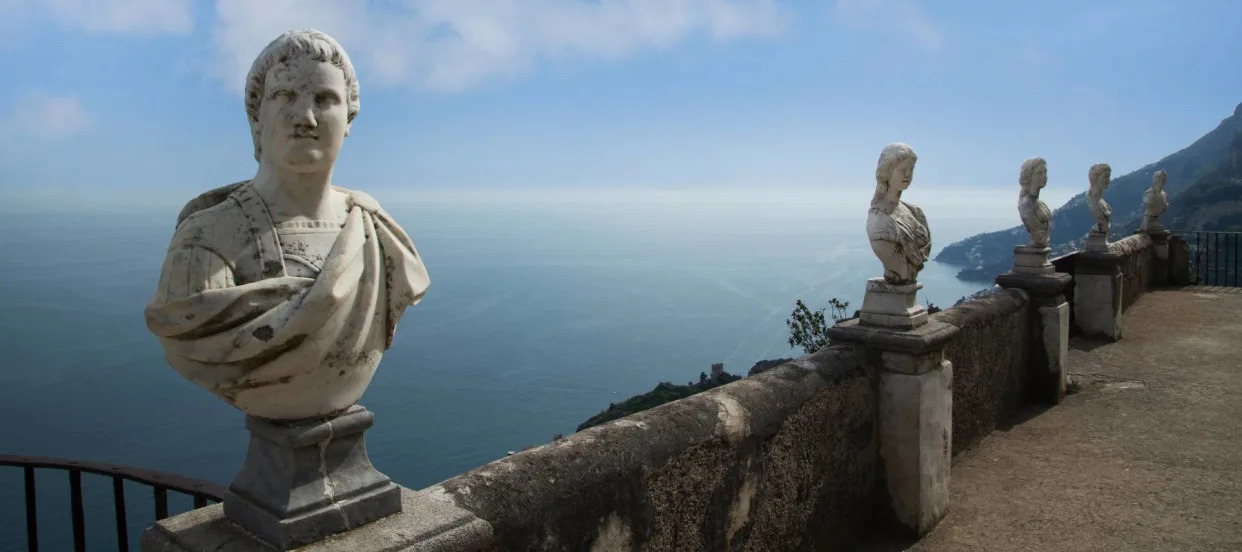Sabina Wex
Thu, September 28, 2023

TikTok’s latest trend has seen women ask the men in their lives one simple question: how often do you think about the Roman empire? And to their shock and amusement, it turns out, for many men, the answer is “often.”
From roads to politics to philosophy, these guys have Rome on their minds.
And Carl Ichan and Ray Dalio aren’t immune to it either. Both investors have recently referenced the Roman Empire’s demise when raising concerns about the nation’s seemingly never-ending inflation woes.
Some even worry history may be repeating itself. But Roman history expert Jack Mitchell says he'd compare the current American climate to the first century b.c. — a full 400 years before the fall of the Roman Empire. But with civil wars and riots, steep inflation and peasant unrest at the time, just because the empire wasn’t crumbling, that doesn’t mean Romans were living la dolce vita, adds the professor at Dalhousie University in Halifax, Canada.
The first century b.c. created inflation, wage stagnation and economic and political destabilization for ancient Roman citizens, which all eventually led to the fall of the empire. So is there a Dark Ages ahead for the American Empire? There are certainly some worrying signs, but experts say it’s not too late to change course.
The similarities
First, the bad news. The current U.S. economy does share some similarities to Rome’s situation prior to the empire’s fall.
Mitchell says the major economic problem Rome faced was its precious metal-based currency. Over time, these coins contained less and less of these valuable materials, so they essentially became worthless. This economic crisis created record-high inflation and a deficit for the state.
Although the U.S. dollar is a fiat currency rather than precious metal currency (like the ancient Roman one), which means its value isn’t as dependent on its resources, Americans who follow the news no doubt have noticed much discussion of the “dedollarization” trend as some countries hope to move away from relying on the USD as a reserve currency. Although government officials say they’re not worried yet, a dethroned dollar could threaten America’s economic stability and lead to hyperinflation — as the Romans experienced.
Inflation aside, an empire’s economic stability often rests on the shoulders of the working class — if they pull out of the workforce, the whole system could easily tumble. For Roman soldiers, Mitchell says, work simply stopped being worth their time. Not only was the pay awful, they were often sent to the army as a way for landowners to avoid taxes by paying with human capital instead.
While no one is sending Gen Z workers to the front lines, today’s high cost of living, coupled with wage stagnation, is an oft-cited reason as to why young workers say they’d rather “clock out eternally” than sit at a desk all day, barely making enough to cover groceries.
Adding to the financial troubles, mistrust in institutions saw deep effects on the economy in ancient Rome. Mitchell says the third century a.d. saw 35 emperors in 50 years, something that didn’t give citizens huge trust in their institutions. Similarly, with political polarization and “fake news,” Americans have also hit a “new low” of distrust in their own institutions, according to a 2022 Gallup poll.
“Once people stop believing in a currency or in political institutions, then it can come tumbling down much faster than you would think,” Mitchell says. “Power and wealth is based on trust.”
The good news is that while they share some similarities, there are enough differences between the U.S. and the Roman Empire to reassure Mitchell.
One major distinction between the two is currency. Again, because the greenback is a fiat currency, the supremacy of the U.S. dollar isn’t as easy to dethrone as it was in ancient Rome. And it doesn’t hurt that due to global trade’s dependence on it, even the Fed’s own Janet Yellen feels safe about its status going forward.
Though it’s been a tough time for young workers, the “summer of strikes” has seen workers actively creating better wages and security for themselves. Plus, with the Federal Reserve pause in interest rate hikes (at least for now), light may be at the end of the tunnel for struggling Americans as the central bank continues its fight against record-high inflation.
Institutional trust is a problem that's much harder to fix. But compared to the ancient Romans, Americans have a lot more control over their lives. If unsatisfied workers don’t like the 9-to-5 corporate life, they simply pick up a side hustle. When they dislike their elected officials, they vote for someone else the next time around.
Rome may have set the stage for America, but that doesn’t mean the country has to follow in its footsteps.
“Even if the American Empire looked like it were starting to falter with inflation and prices and authority,” Mitchell says, “one lesson is that it's possible to breathe new life into these old structures, economically and politically.”
No comments:
Post a Comment